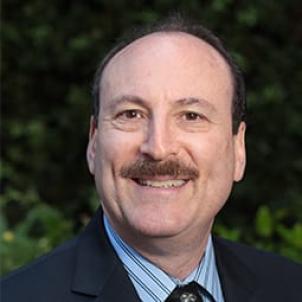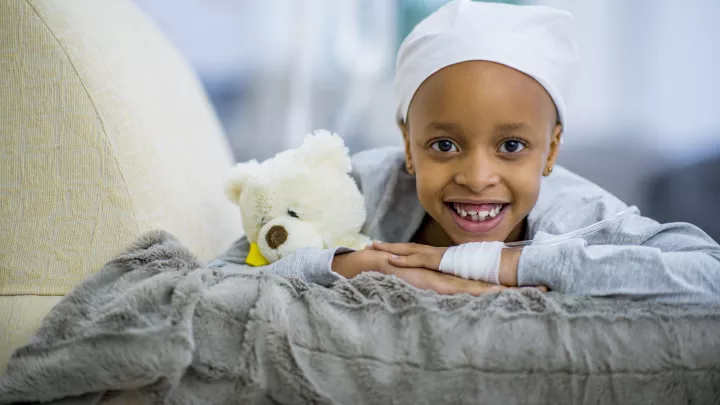
Radiation Oncology Leaders Win $2.1M SBIR Grant to Improve Treatment Outcomes for Children With Brain Tumors
Advances in radiation therapy have provided groundbreaking innovations in treating children with brain tumors. Treatment methods are increasingly more precise to avoid damaging surrounding healthy tissue.
Still, radiation therapy is not without risk, especially in an area as sensitive as the brain. Brain radiation therapy can result in long-term cognitive effects that impact memory, learning and attention—adding undue challenges to daily life years after a patient is treated for their tumor.
“We have very sophisticated ways to deliver radiation, and we have the means to steer the dose directly to the tumor and away from critical substructures of the brain—if we can identify those structures,” says Arthur Olch, PhD, Chief of Physics in the Radiation Oncology Program at Children’s Hospital Los Angeles.

Dr. Olch and CHLA investigators are collaborating with radiation oncology software company Voxel Healthcare to jointly advance the company’s AI-driven clinical decision support product and transform how doctors plan brain radiation therapy. Voxel was co-founded by two researchers at CHLA and has evolved into an independent business.
The collaborators recently received a $2.1 million grant from the Small Business Innovation Research (SBIR) program at the National Institutes of Health to further validate and commercialize this innovation.
“Our main purpose at Voxel Healthcare is to give children a higher chance of reaching their full potential,” says Natasha Leporé, PhD, CHLA brain imaging scientist and co-founder and CTO of Voxel. “We’re excited to work alongside CHLA investigators to achieve this important goal.”
Training AI to segment brain structures
While the standard of care for brain tumor radiation treatment already focuses on minimizing the dose to healthy tissues as much as possible, Dr. Olch maintains that machine learning technologies can help add next-level precision to radiation treatment plans and create a paradigm shift toward improved long-term health outcomes after radiation.
Several brain substructures have well-recognized implications for cognition, especially in growing children. Voxel Healthcare’s product, ClickBrain RT, runs on an AI model trained to segment the brain based on hundreds of MRI images where neuroanatomy experts have drawn out these critical brain substructures.
“When radiation oncologists create treatment plans, our focus is to zero in on the tumor and target it as precisely as possible,” says Dr. Olch. “The process is meticulous, but our focus hasn’t been on segmenting specific brain sub-structures like a corpus callosum or hippocampus.”

Even if radiation oncologists were experts in the finer points of brain substructures, Dr. Olch points out, not enough research has been conducted to create standards for optimal tolerable doses in these areas. Tolerance dose-driven radiation treatment is a common practice in radiation that exists for the kidney, heart and other key organs, but not yet for specific regions of the brain.
Grant funds will enable collaborators to evolve ClickBrain RT to not only auto-segment key brain areas associated with neurocognitive effects, but also to deliver clinical decision support on dosing based on age, chemotherapy dose, tumor type, grade and location.
To train the technology’s machine learning algorithm, researchers will also supply it with a body of demographic and neuropsychological data on pediatric brain tumor patients who were previously treated with radiation to better correlate radiation doses to their effects.
Intelligent technology boosts clinical efficiency, lifelong health outcomes
“AI has been making great strides in the healthcare space, and there are many technologies that can help with the segmentation of key organs like the lungs, heart, kidneys and brain,” says Justin Low, MD, Head of Medical Development at Voxel. “However, very few have focused on pediatrics or the long-term outcomes that radiation can affect in a child.”
The ultimate objective of the SBIR grant is to advance and further validate the technology so it is available to radiation oncologists everywhere. “Our goal is to empower clinicians to develop and evaluate radiation therapy plans for new patients with a level of information they’ve never had before,” says Dr. Olch. “It will transform their planning process.”
For children and their families facing radiation therapy, this technology may help ensure they never have to weigh the benefits of lifesaving tumor reduction against the risk of long-term cognitive effects.
“When you cure an 8-year-old patient of their brain tumor, you want to give them the best chance of living the next 70-plus years of their life as healthily and as independently as possible,” Dr. Olch says.
Grant team:
Dr. Olch, MD, FAAPM, is CHLA’s principal investigator. Principal investigators from Voxel Healthcare include Justin Low, MD, MHA and Natasha Leporé, PhD. CHLA co-investigators include Kenneth Wong, MD, Marvin D. Nelson, MD, MBA, FACR, Ashley Wittaker, PhD, ABPP-CN and Mary B. Nelson, PhD, RN, CNCP. Co-investigators from Voxel Healthcare include Niharika Gajawelli, PhD, Jaime Stern, and biostatistics consultant Lilith Chemenyan Moss, PhD. This project is also supported by the Consortium for Technology and Innovation in Pediatrics.
This work is supported by the National Institutes of Health Small Business Innovation Research program under grant number 1R44CA281709-01A1.


